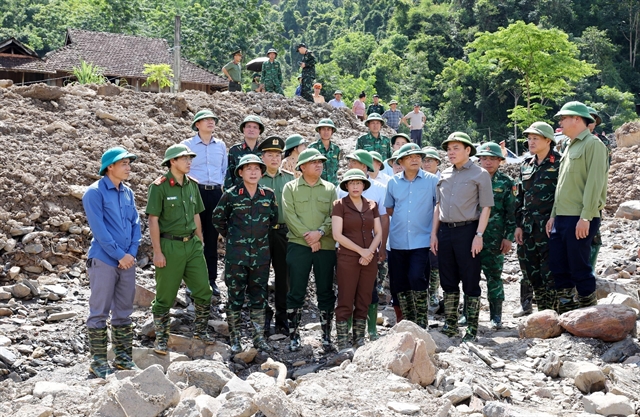 Society
Society


|
| Deputy Prime Minister Trần Lưu Quang inspects the damage following devastating floods in Điện Biên Province on Sunday. VNA/VNS Photo |
ĐIỆN BIÊN The Government has decided to urgently allocate VNĐ10 billion (US$398,700) to the northern mountainous province of Điện Biên to overcome the consequences of recent rainfall and floods and stabilise local livelihoods.
During a working session with local authorities on Monday, Deputy Prime Minister Trần Lưu Quang asked relevant agencies to closely monitor weather developments and strengthen forecasting and warnings.
Local authorities have been told to prepare scenarios to respond to extreme natural incidents and ensure safety of lakes, dams. They must also strengthen information and communication work for the steering committees for natural disaster prevention, control, search and rescue at all levels and local people.
According to local authorities, the province has suffered from 26 natural disasters since early this year, which have killed nine people, injured 12 and left four others missing.
About 1,300 houses were damaged while over 1,700ha of agricultural land was destroyed.
Floods have caused damage to many infrastructure projects in transportation, irrigation, electricity, communications, healthcare and education.
The total damage from early this year to August 2 was estimated at VNĐ256.5 billion.
The heavy rains, floods, flash floods and landslides from July 23 to August 2 alone left destruction of about VNĐ211.5 billion.
Deputy PM Quang asked the province to maximise local forces to participate in damage recovery and improve search and rescue efficiency.
Local authorities also need to support residents in natural disaster areas to stabilise their lives and production, he said.
In a related move, Prime Minister Phạm Minh Chính has issued an official dispatch, demanding proactive moves to prevent, control, and address natural disaster consequences.
The dispatch noted that abnormal and unpredictable natural disasters have continued occurring since the start of 2024. Strong heat waves, drought and prolonged saltwater intrusion in the year’s beginning were followed by continuous heavy rains, landslides and flooding in many places, especially in the northern, north-central and Central Highlands regions.
Despite the PM’s directions and ministries, sectors, and localities’ moves to prevent and respond to natural disasters to minimise damage, the calamities have still taken a heavy toll on people’s lives and property, infrastructure, along with economic activities.
Data from the Ministry of Agriculture and Rural Development show that 104 people have died or went missing in natural disasters, mainly landslides and floods, so far this year.
The National Centre for Hydrometeorological Forecasting predicted that the La Nina phenomenon is likely to affect Việt Nam from August and result in more severe storms, downpours, flooding, flash floods, landslides and reservoir unsafety, posing serious threats to economic and daily activities, as well as people’s lives and property.
Facing that fact, PM Chính demanded ministers, heads of ministry-level agencies, Government agencies and chairpersons of the provincial-level People’s Committees to keep authorities at a close watch on disaster developments and carry out strong, timely and efficient measures for disaster response and dealing with the aftermath.
Leaders of provincial-level administrations were asked to stay more active in directing and organising the prevention, control, and settlement of natural disaster consequences in line with 'on-site command, on-site forces, on-site vehicles and supplies, and on-site logistics', with the most active, timely, and resolute spirit to guarantee life safety and minimise property losses for people and the State.
In the dispatch, the Government leader told localities to quickly perfect response plans for each type of possible calamity, especially storms, flooding, landslides, and flash floods, to identify vulnerable places, ready response forces and vehicles and accelerate preparations before the season of floods and storms.
In addition, they were also requested to evacuate residents and property from dangerous areas, especially those susceptible to landslides, flash floods and flooding and arrange funding from the local budget for disaster response activities to ensure no one is left without a living place, food, or other essential supplies, prevent serious disease outbreaks and environmental pollution and avoid serious impact on students’ learning. VNS




